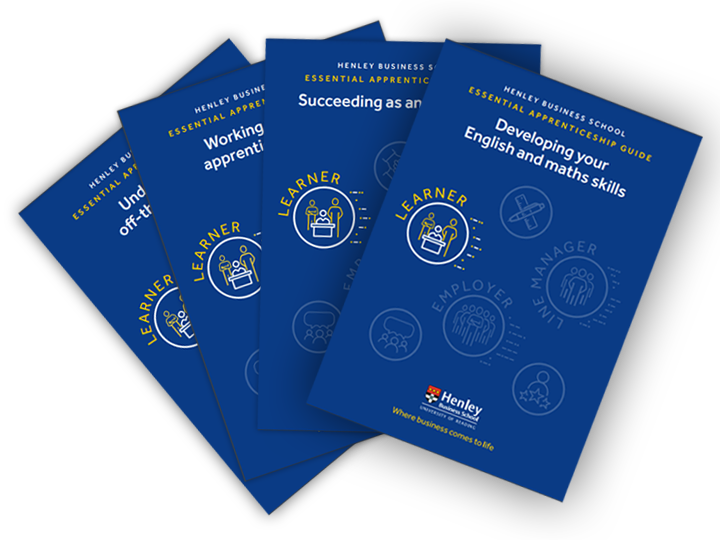Preparing for a successful apprenticeship
Many of Henley's apprentices are returning to learning after a break and may not have had to juggle new learning with work previously. Utilise the information and guides here so you're ready to start on your apprenticeship journey and make the most of your learning experience.

Helping you every step of the way to the start and beyond
This page provides you with some learning tips and tricks to practice ahead of starting your apprenticeship, so you're able to more easily absorb all the new knowledge, skills and behaviours your apprenticeship is designed to help you develop. And keep you up to date with some of Henley's research and thinking from the faculty involved in teaching Henley's programmes.
Many tips are available for those returning to studying after a long break. Here are some of our top three to help get you started.
Manage your time
Your apprenticeship is done with the support of your line manager. They should ensure you can fully use your 6 hours off the job learning, but in addition to that, it's worth checking in advance your programme timetable, not only for when workshop sessions are scheduled but also when projects are due in.
Time management is not just an issue that is important to your work; it is crucial to your daily life and well-being.
This guide from the Henley Business School librarian team provides some simple but effective exercises that will help you become more aware of how you manage yourself. There are no right or wrong answers, only honest ones, so if you undertake the exercises, be honest with yourself.
Broaden your content horizon
Many of us are now in specialist roles. Henley's apprenticeships will introduce you to some new business areas and other external business challenges, so start reading business sections and articles in the media and take this opportunity to familiarise yourself with other business areas outside your typical everyday.
Henley's academics are widely published - so have a read-through of some of their latest leading insights.
Developing your study skills
Methods of studying has evolved a lot in recent years. Once fully enrolled in the apprenticeship, you can access Henley's online library where you can find lots of useful study tools, but here is a sample of the top 3 that Henley students have recommended over the years.
Mind-mapping
Using mind maps is an ideal opportunity to use creative problem solving, for organising and generating ideas and for reviewing a wide range of diverse information. Using mind maps is an ideal method for capturing your own thought processes, which then enables you to recall information that you will have previously stored visually quickly.
Brainstorming
Is a useful tool used for generating ideas relating to particular issues. This is often used in the work environment or as part of your programme where you may want to generate multiple ideas.
Harvard Referencing
Throughout your work-based projects/assignments, you will need to correctly reference your work. This quick start guide introduces academic referencing and explains how to cite and reference some of the most commonly encountered source types using the Harvard referencing style which is followed at Henley Business School.
This is a useful guide to have to hand when you start your projects and as you develop your reading lists.

As an established provider of apprenticeships, we understand how they can deliver organisational impact. Explore our recommendations for you and your employers.
Download the Henley Essential Apprenticeship Guides
Read just some of our apprentice alumni case studies and testimonials and see how their new knowledge, skills and behaviours are impacting them, their teams and their organisations.

The four-day work week is a success, but are customers ready for it?
The service sectors have a long record of adapting working policies to the customer. Will four-day working be the exception? Professor Adrian Palmer explores.
A long-awaited report published this week supported what we have been saying for a while – the four-day week is a success. In a study of 61 companies, employees raved about work-life balance and employers were generally positive about the effects on bottom lines, notwithstanding reduction in working hours. Many commented that reducing working hours saw an improvement in productivity, something the UK has been struggling with for a while.
Contact us
If you have any questions or would like to learn more about our apprenticeship programmes, please contact:
Telephone: 0118 378 4030
This site uses cookies to improve your user experience. By using this site you agree to these cookies being set. You can read more about what cookies we use here. If you do not wish to accept cookies from this site please either disable cookies or refrain from using the site.